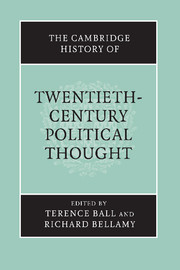Book contents
- Frontmatter
- Editors’ introduction
- Part I The changing fortunes of liberal democracy
- Part II Varieties of Marxism
- Part III Science, modernism and politics
- Part IV New social movements and the politics of difference
- Part V Beyond Western political thought
- 26 Non-Western political thought
- 27 Islamic political thought
- 28 Epilogue: The grand dichotomy of the twentieth century
- Biographies
- Bibliography
- Subject index
- Name index
- References
27 - Islamic political thought
from Part V - Beyond Western political thought
Published online by Cambridge University Press: 28 March 2008
- Frontmatter
- Editors’ introduction
- Part I The changing fortunes of liberal democracy
- Part II Varieties of Marxism
- Part III Science, modernism and politics
- Part IV New social movements and the politics of difference
- Part V Beyond Western political thought
- 26 Non-Western political thought
- 27 Islamic political thought
- 28 Epilogue: The grand dichotomy of the twentieth century
- Biographies
- Bibliography
- Subject index
- Name index
- References
Summary
Two interrelated issues are central to Islamic political thought in the twentieth century: the relationship between religion and politics and the role of the Islamic heritage in modern society. The treatment of these issues began in the nineteenth century, in the context of Muslim societies’ encounter with the West. Commencing with the Napoleonic invasion of Egypt (1789–1803), and extending through a period of Western Christian missionary activities in Muslim countries, Muslim educational missions to Western countries and, finally, to colonial rule, Muslim societies came into contact with modern Western ideas and ways of life. Through this encounter, the view of Western material progress was impressed on these societies. It was expressed in orientalist constructions of the East and in the apologetic and defensive discourses of the indigenous intellectuals. In Arab and Islamic thought, the problem of nahda (renaissance) crystallised. In Istanbul, the seat of Ottoman power, ideas of reform were developed and debated. Muslim reformist views also took shape in India. In Iran, the era in which modernising ideas and concepts were introduced became known as the asre bidari (period of awakening) (Mirsepassi 2000, p. 56; Gheissari 1998, pp. 14–15). By the end of the nineteenth century, modernist thought integrated nationalist principles and ideas.
At the turn of the twentieth century, Muslims were chiefly concerned with the problem of civilisational stagnation. The main problématique was formulated in terms of a renaissance project for Muslim societies. The articulation of this problématique was shaped by the encounter with the West in the modern period. Various intellectual positions were formed during this period of encounter, ranging from Islamic modernism to secularism.
- Type
- Chapter
- Information
- The Cambridge History of Twentieth-Century Political Thought , pp. 579 - 601Publisher: Cambridge University PressPrint publication year: 2003
References
- 3
- Cited by

